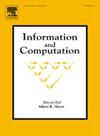图行走自动机和星形子图倾斜的空虚性问题的复杂性
IF 0.8
4区 计算机科学
Q3 COMPUTER SCIENCE, THEORY & METHODS
引用次数: 0
摘要
本文证明了识别有限图的两种模型--图行走自动机和星形子图(星形自动机)--的空性问题的可解性。此外,我们还证明了图行走自动机的非空虚性问题(即给定自动机是否接受至少一个图)是 NEXP-完备的。对于将非确定树自动机推广到图情况的星形自动机,证明了它们的非emptiness 问题是 NP-complete。本文章由计算机程序翻译,如有差异,请以英文原文为准。
Complexity of the emptiness problem for graph-walking automata and for tilings with star subgraphs
This paper proves the decidability of the emptiness problem for two models which recognize finite graphs: graph-walking automata, and tilings of graphs by star subgraphs (star automata). Furthermore, it is proved that the non-emptiness problem for graph-walking automata (that is, whether a given automaton accepts at least one graph) is NEXP-complete. For star automata, which generalize nondeterministic tree automata to the case of graphs, it is proved that their non-emptiness problem is NP-complete.
求助全文
通过发布文献求助,成功后即可免费获取论文全文。
去求助
来源期刊

Information and Computation
工程技术-计算机:理论方法
CiteScore
2.30
自引率
0.00%
发文量
119
审稿时长
140 days
期刊介绍:
Information and Computation welcomes original papers in all areas of theoretical computer science and computational applications of information theory. Survey articles of exceptional quality will also be considered. Particularly welcome are papers contributing new results in active theoretical areas such as
-Biological computation and computational biology-
Computational complexity-
Computer theorem-proving-
Concurrency and distributed process theory-
Cryptographic theory-
Data base theory-
Decision problems in logic-
Design and analysis of algorithms-
Discrete optimization and mathematical programming-
Inductive inference and learning theory-
Logic & constraint programming-
Program verification & model checking-
Probabilistic & Quantum computation-
Semantics of programming languages-
Symbolic computation, lambda calculus, and rewriting systems-
Types and typechecking
 求助内容:
求助内容: 应助结果提醒方式:
应助结果提醒方式:


